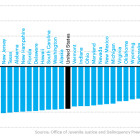
States Look Beyond Incarceration to Rearrest Rates
|
When juvenile justice leaders gathered in Texas earlier this month, policymakers from the Council of State Governments greeted them with some good news and some troubling news.
Juvenile Justice Information Exchange (https://jjie.org/tag/kids-and-the-law/page/5/)

When juvenile justice leaders gathered in Texas earlier this month, policymakers from the Council of State Governments greeted them with some good news and some troubling news.

We prohibit young people from engaging in a whole host of things because we feel they lack the maturity to fully grasp the potential consequences of their actions. In spite of this, we support the idea that an adolescent who commits a violent act has somehow overcome the well-known cognitive and behavioral limitations of their age and should now, in the eyes of the court, be seen as an adult.

It is difficult to repair a broken relationship, one built on years of distrust. It is especially tough if you are the parent of a child forever getting caught up in the juvenile justice system, knowing their kid can be harassed and possibly injured or arrested for simply walking down the street.

A pilot program in Michigan provides police training on how to recognize and respond to mental health and substance abuse problems with youth.

As a Public defender with the Legal Aid Society’s Adolescent Intervention and Diversion Project, Donna Henken works with 13- to 15-year-olds charged with felony crimes. These adolescents are known as juvenile offenders and they are tried in adult criminal court rather than family court. Henken’s clients struggle with the same issues as juveniles in the family court system. According to the Legal Aid Society, about 20 percent of these youth have experience with the foster care system. Almost two-thirds have special-education needs and about 25 percent of them have significant mental health issues that require ongoing care.

“The general purpose of this grant is, really at a high level, to engage potential government partners at the county-level, and engage and educate them about the Pay for Success opportunities in these two areas."

In just one day spent in the juvenile court, orders of protection are issued, as well as plenty of warrants for defendants who fail to show up.

In Calcasieu Parish, La., a one-stop “Multi-Agency Resource Center” under the Office of Juvenile Justice Services serves as a centralized intake point for families in need of services. Interventions like this are part of a growing effort to keep youths out of court for “status offenses” such as truancy, running away from home or drinking alcohol. Now there’s a vast new online resource for jurisdictions seeking alternatives to the courts for status offenses. The Status Offense Reform Center, launched Friday by the Center on Youth Justice at the nonprofit Vera Institute of Justice, brings together step-by-step guides to the reform process, case studies from the field, advice from experts on handling status offenses, a huge online library and other resources.

Public defender Drayton refuses to view his young indigent clients as “the problem” -- rather, he believes their actions are symptomatic of a much larger issue within many U.S. communities.

To provide insight into the shadowy world of juvenile public defense, JJIE spent a day trailing juvenile public defender Pinkney at the Alameda County Juvenile Justice Center, atop a hill in this city in the East Bay, just south of Oakland.